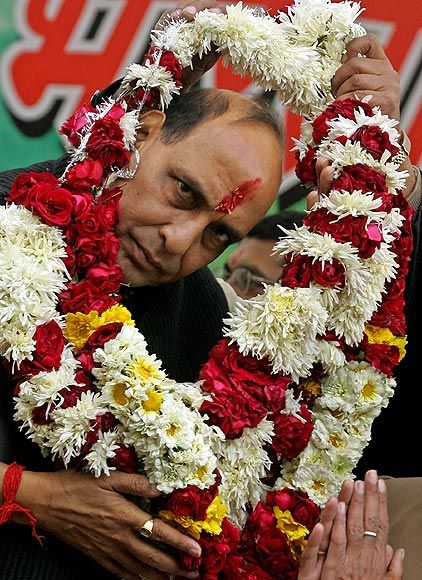According to community leaders, Rajnath Singh has filled party posts with Thakurs and pushed Brahmins to the margins. Archis Mohan reports The Bharatiya Janata Party's upper caste vote base is showing first signs of cracks in Uttar Pradesh.
The Bharatiya Janata Party's upper caste vote base is showing first signs of cracks in Uttar Pradesh.
Brahmins, who constitute slightly over 10 per cent of the state's population, are mighty peeved over the increasing 'Thakurwaad', being 'promoted' by BJP President Rajnath Singh in the party.
According to community leaders, Rajnath has filled party posts with Thakurs and pushed Brahmins to the margins.
Brahmins, from Varanasi to Lucknow, also claim Thakurs, eight per cent of UP’s population and who own nearly half its farmland, are hoping one of their own will unfurl the national flag from Delhi’s Red Fort this Independence Day.
After V P Singh and Chandra Shekhar, there have been no Thakur prime ministers.
Thakur leaders vehemently deny this as a smear campaign to break BJP’s support base and contest the “propaganda”.
Omkar Singh, a Lucknow-based political activist and former Samajwadi Party leader, says Brahmins were past masters at such tricks.
“They launched a similar campaign against Mayawati in the run-up to the 2012 Assembly elections that she worked only for Dalits. This contributed to her defeat, despite having run an effective administration. But the moment she reached out to Thakurs, the Brahmin lobby maligned her,” he says. Brahmins could not tolerate Thakurs having come to occupy important positions in the BJP at a time, when the party was set to form the next government at the Centre, he added.
However, there exist several factors why this so-called propaganda has gained ground.
These days, it is usual to hear political discussions at street corners and tea stalls across UP that Rajnath could be a more acceptable face than BJP prime ministerial candidate Narendra Modi to potential allies if the NDA were to fall way short of the 272 Lok Sabha seats.
Rajnath’s importance in his party’s and the Rashtriya Swayamsevak Sangh’s scheme of things and his contesting elections from Lucknow, the Lok Sabha constituency of BJP’s most known moderate face, Atal Bihari Vajpayee, has lent credence to this.
This seemingly widening Brahmin-Thakur divide in the Hindi heartland is an unexpected subtext in the Hindutva narrative of the BJP, which had hoped to reap rich dividends by fielding Hindutva icon Modi.
This nascent caste rivalry between UP’s two most influential caste groups can potentially threaten the party’s bid to create a religious polarisation.
The dissent from Brahmins is most voluble in Varanasi city, which has substantial Brahmin voters.
The city’s Brahmins still dismiss suggestions that they could vote for anybody but Modi.
They, however, bemoan that BJP under Rajnath was fast becoming a Thakur party, while sidelining Brahmins.
Koushal Kishor Mishra, professor of political science at Banaras Hindu University, complains the way BJP’s “senior leadership” has been treated could have been avoided.
“I hope the party would address this sense of hurt,” he says.
Mishra is an enthusiastic Modi supporter who is busy preparing a monograph on how Modi’s ancestors had close links with Varanasi.
Pradeep Choubey, who runs a milk shop in Varanasi, is more forthright in his criticism.
“The BJP under Rajnath Singh has insulted senior leaders like Kalraj Mishra and Murli Manohar Joshi here and Lalmuni Choubey as well as Tarakant Jha in Bihar, while Thakurs with tainted records have been inducted in the party,” he says.
The BJP has reached out to and won over Thakur leaders as Jagdambika Pal and Brij Bhushan Singh. Pal is the party’s likely candidate from Domariyaganj, a choice that has led to much resentment and open protests in the party ranks, while Brij Bhushan’s name has been announced from Gonda.
Giving party's ticket for Ghaziabad seat to former Army chief General V K Singh and inducting N K Singh in Bihar are cited as further examples of Thakurwaad in BJP.
Others like BSP have been awake to the possibility of reaching out to the Brahmin voters.
Mayawati has fielded 21 Brahmin candidates, the most by any party until now in Uttar Pradesh, in a bid to replicate her Brahmin-Dalit-Muslim alliance that got BSP a majority for the first time in UP assembly in 2007.
Political observers in Lucknow believe Rajnath is already feeling the heat in his chosen seat of Lucknow, which has 15 per cent Brahmins and 30 per cent Muslims.
His prominent opponents are all Brahmins -- Congress’s Rita Bahuguna-Joshi and BSP’s Nakul Dube.
The SP on Thursday changed its candidate Ashoke Vajpayee with minister and UP CM Akhilesh Yadav’s aide, Akhilesh Mishra, in an effort to give Rajnath a tougher fight.












 © 2025
© 2025